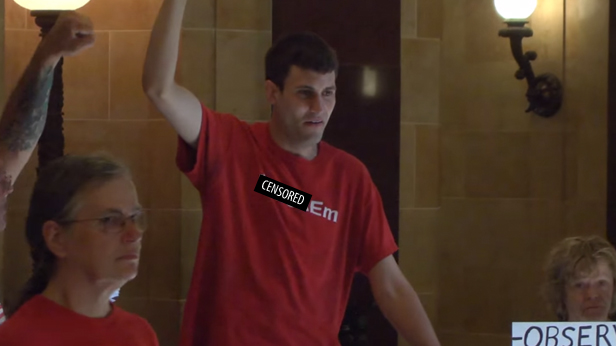
June 12, 2015
By Nick Novak
MacIver Institute Director of Communications
It may not be who you think, though. The money was not awarded to the multiple legislators that were consistently harassed in the halls of the capitol or now-Assembly Speaker Robin Vos (R-Rochester) who had a beer poured on him. The thousands of dollars will not go to the governor who was routinely compared to Adolf Hitler, nor will his family – which received countless death threats – see any reparations.
Instead, six protesters – some of which took a leading role in the more outlandish scenes at the capitol – will receive damages from taxpayers in the amount of $44,830.
According to court records, Jeremy Ryan (better known as Segway Boy), Jenna Pope, Valerie Walasek, Lauri Harty, Anne Hoppe and Kathleen Hoppe will each receive between $1,000 and $5,200 each for damages. Taxpayers will also cover all of their legal fees, ranging from $2,500 to $4,900 each.
The six protesters filed a lawsuit against the state’s Department of Administration, claiming wrongful arrests during the Act 10 protests and sought compensation. Dane County Judge Frank Remington decided in their favor on Tuesday.
In the case, the plaintiffs argued that they “suffered several different sorts of discrete and compensable injuries,” according to their Trial Brief.
Ryan and his friends first argued they lost their feeling of belonging when they were arrested.
“Each Plaintiff will testify that he or she was spurred to participate in public expression in the Capitol because of intense antipathy to the Walker Administration’s legislative agenda and its practice of ramming significant measures through the legislative process without deliberation of public participation.
“The Plaintiffs felt powerless before they took action, and demonstrating in the Capitol gave them a feeling of mission and empowerment. The feeling was taken from them when their expressive activity was terminated by the Defendants before its time, each time they were cited and required to stop their efforts, and each of them is entitled to be compensated for the loss of this valuable feeling.”
They argued their liberty was threatened when they were wrongfully arrested, which required just compensation. The six also argued for compensation for attorney fees and the inconvenience of having to appear in court.
But that wasn’t quite enough. Segway Boy et al claimed their arrests caused them embarrassment, created difficulties in finding a job or housing and fostered a negative “cyber stigma” that will follow them for the rest of their lives.
Don’t worry though, taxpayer money will solve all of these problems.
From the plaintiff’s Trial Brief:
“Some of the Plaintiffs have extremely conventional lives and clean records except for these prosecutions. They will testify as to the embarrassment and humiliation they felt when it became known by acquaintances, friends and family members that they had been cited by the police and were being prosecuted. One Plaintiff’s father stopped talking to her for a period of time. They are each entitled to be compensated for these adverse experiences.”
The protestors were also concerned about how their arrests would impact future job searches:
“Some Plaintiffs will testify that they have already had difficulties, being called upon to explain the presence of these prosecutions on their records. They are all entitled to be compensated for any additional anxiety their records have caused them when dealing with the prospective educational institutions, employers, landlords and licensing agencies.”
The state, led by Assistant Attorney General Maria Lazar, argued the case files highlighted by the plaintiffs were not relevant in a brief submitted to the court on Tuesday. However, Judge Remington still awarded each protester a hefty sum with his decision.
The most well-known Capitol protester of the group, Segway Jeremy Ryan will receive $10,840 in compensation from the state in damages and attorney fees. Ryan, who is most-recognizable for riding a Segway everywhere, is not new to Wisconsin’s court system.
He has been charged with disorderly conduct 16 times, though 14 of those were conveniently dismissed. Ryan has also been charged six times with unlawful assembly, once for an unlawful display or decoration and once for demonstration/picket without a permit.
These are just a select few from Segway Boy’s record. Ryan also challenged U.S. Rep. Paul Ryan in the Republican primary for the Wisconsin’s first congressional seat in 2014 with the platform that he would legalize marijuana. He lost.
The only plaintiff to receive more in compensation than Ryan was Valerie Walasek. According to court records, Ryan posted on his Facebook page in February and March of 2011 that “he was looking for people to come to the Wisconsin State Capitol to hold signs and get arrested.”
Walasek, a former Madison resident that lived in Florida in 2011, responded to Ryan with a message that said she was a disabled vet and the she was willing to “do whatever it would take to make a change” and that she was willing to come back to Wisconsin.
She will receive $11,760 in total compensation from the state.
The other protesters will receive smaller sums: Lauri Harty ($8,900), Jenna Pope ($5,250), Kathleen Hoppe ($5,000) and Anne Hoppe ($3,000).
At this time the state has not announced if it will appeal Judge Remington’s decision.
Check out the MacIver Institute’s video from some of Segway Jeremy Ryan’s greatest hits, published when he ran for Congress last year: